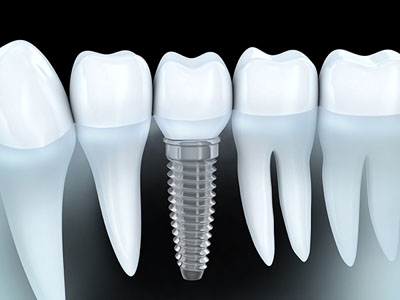 Dental implants are changing the way people talk about losing teeth and the possible treatments after the fact. In the past, conversations about tooth loss involved archaic technology like bridges and dentures, but today, our Houston dental office has a way to not only replace the lost surface of a tooth but also give a prosthetic root in the form of a dental implant. As more people are becoming aware of this revolutionary product, we get more questions every day about how it works, what is involved in getting a dental implant, and if the individual is a strong candidate for dental implants. The first thing to understand about a dental implant is that it replaces the lost root of a fallen tooth. To do this, the implant must be surgically placed into the jawbone by a skilled periodontist or oral surgeon, which means there is surgery involved. In order to get a dental implant, the patient’s mouth needs to be healthy enough for the procedure. While it is not common, we do find cases where people are not able to get implants immediately, and some remedial steps must be taken to prepare them for the implants. People with uncontrolled diabetes or periodontal diseases, for example, are not able to get implants. Similarly, patients who may be undergoing radiation treatment for cancer or who have a heavy addiction to cigarettes or alcohol may be precluded, as well. The reasons these conditions may prevent you from getting dental implants is because the jaw needs to be able to fuse with the implant, and any condition that may restrict or stop that process from happening could be detrimental to the implant itself.
Dental implants are changing the way people talk about losing teeth and the possible treatments after the fact. In the past, conversations about tooth loss involved archaic technology like bridges and dentures, but today, our Houston dental office has a way to not only replace the lost surface of a tooth but also give a prosthetic root in the form of a dental implant. As more people are becoming aware of this revolutionary product, we get more questions every day about how it works, what is involved in getting a dental implant, and if the individual is a strong candidate for dental implants. The first thing to understand about a dental implant is that it replaces the lost root of a fallen tooth. To do this, the implant must be surgically placed into the jawbone by a skilled periodontist or oral surgeon, which means there is surgery involved. In order to get a dental implant, the patient’s mouth needs to be healthy enough for the procedure. While it is not common, we do find cases where people are not able to get implants immediately, and some remedial steps must be taken to prepare them for the implants. People with uncontrolled diabetes or periodontal diseases, for example, are not able to get implants. Similarly, patients who may be undergoing radiation treatment for cancer or who have a heavy addiction to cigarettes or alcohol may be precluded, as well. The reasons these conditions may prevent you from getting dental implants is because the jaw needs to be able to fuse with the implant, and any condition that may restrict or stop that process from happening could be detrimental to the implant itself.
Dental implants, according to some studies, have a success rate hovering around 98 percent. Even the most conservative estimates place the success rate around 92 percent and 94 percent. This is not just luck, but due to the diligence we exercise each time a patient comes in looking for dental implants. The dental implant process starts with a comprehensive examination, which includes both x-rays and a CT scan. These dental imaging tools allow our Houston dentist office to access your jawbone, determine the level of density, and make a judgment as to whether it can sustain and support a dental implant. Once this is done, we can proceed in one of two directions.
For the patients who have sufficient bone density, we go to the implant phase in that very first appointment. This is known as an immediate implant placement since there is no wait time. For other patients, however, they may need an alveolar bone graft, which targets the area of the jawbone that supports the teeth. Often, an onlay graft is necessary to create a strong block of bone, into which we can then place the implant. This block allows the implant the stability and security it needs. Once the grafting is done, you will take around six months to allow it to fully heal before we start placing the dental implants into the newly grafted bone.
Related Posts
The Role of the Jawbone in Dental Implant Placement
If a lost tooth is not replaced by replacement options like dental implants, you may find normal oral functions like eating and speaking somewhat challenging. The smile’s alignment and appearance will also …
Contraindications to Dental Implant Placement
While dental implant placement is one of the most effective ways to replace missing teeth, there are some scenarios in which these implants cannot be placed. Because dental implant placement requires surgery, …
Reasons to Consider Dental Implants to Replace Multiple Missing Teeth
Considering dental implants to replace missing teeth?No matter how it happens, having missing teeth can make anyone feel self-conscious. Instead of smiling naturally, people with missing teeth tend to hide their …
What to Ask Your General Dentist About Multiple Dental Implants
General dentists offer dental implants to patients with missing teeth to address cosmetic, functional and oral health concerns. Many patients do not know how to prepare for the consultation visit for …





